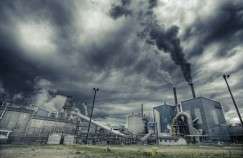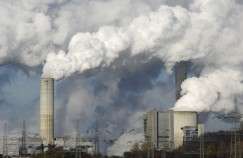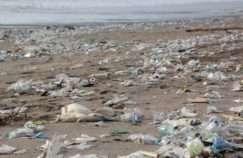The climate crisis is a human rights crisis driven by fossil fuels. Fossil fuels are the overwhelming source of the greenhouse gas (GHG) emissions causing global warming. We have less than five years to cut emissions in half and less than three decades to effectively eliminate fossil fuel emissions if we are to keep global temperature rise below 1.5° Celsius and avoid the most catastrophic impacts of climate change. Oil, gas, and coal account for more than 75 percent of GHG emissions and nearly 90 percent of all carbon dioxide emissions. Fossil fuel production ineluctably leads to significant emissions across all phases, from the extraction and processing of oil, gas, and coal, to their transport and intended end use, primarily combustion.
As oil and gas companies continue to expand their extraction capacity, they are aiming to open new frontiers — with promises of revenue enticing new producing countries and myths of carbon capture greenwashing the climate risks. We cannot tackle the climate crisis without phasing out fossil fuels, beginning with an immediate halt to expansion of oil and gas production, both onshore and offshore. We must also accelerate a rapid and equitable transition away from oil and gas, remove legal barriers and open legal pathways to phasing out fossil fuels, end public and private funding for fossil fuels, and redirect finance toward renewable energy and energy efficiency alternatives.
Fossil Fuels and Climate
Human activity, principally the production and combustion of fossil fuels, has increased the concentration of GHGs in the atmosphere to its highest level in at least 800,000 years. For decades, the scientific community has concluded that fossil fuels are the main driver of rising GHGs. These GHGs, from land-based, ocean-based, and/or airborne sources, have caused global warming, increasing the current average global temperature to 1.35°C above pre-industrial levels. This warming, in turn, has caused significant changes in the global climate system, resulting in escalating harm to human rights and the environment.
The fossil fuel industry has known for more than sixty years that its products are causing climate change, with devastating consequences for people and the planet. And yet it has not only continued but expanded its activities, engaging in tactics of obstruction and deception that have prolonged reliance on oil and gas and delayed necessary climate action.
Oceans play a critical role in stabilizing the global climate. They are the Earth’s biggest carbon sink and have a tremendous capacity to store and release heat over long periods of time. However, this role is jeopardized by continued GHGs, overwhelmingly from fossil fuels. And a rising wave of offshore oil and gas activity, driven in part by the recent boom in production of liquified natural gas (LNG), only amplifies this threat, in particular because:
- GHG emissions are causing marine pollution according to the International Tribunal for the Law of the Seas (ITLOS)’s Advisory Opinion, including from carbon dioxide and methane (the main GHG that is extracted as fossil gas).
- Ocean acidification is increasing due to increased concentration of human-induced carbon dioxide in the atmosphere, around one third of which is absorbed by the oceans. Acidification has devastating impacts on marine life, including coral reefs and other organisms that need calcium for their shells and skeletons.
Oil & Gas Expansion
Despite the urgent need to reduce reliance on fossil fuels and slash the emissions they generate, governments still plan to produce more than double the fossil fuels in 2030 than would be consistent with limiting warming to 1.5°C. Many of the companies and countries that are the biggest producers continue to invest in expansion. As fossil fuel companies face mounting resistance from frontline communities on land, oceans are increasingly the target of new oil and gas production and infrastructure. Offshore fields are thus a major focus of new development, as evidenced by a significant scaling up of drilling operations across an ever-growing range of locations.
The oceans are increasingly strained by the effects of climate change, including rising temperatures and acidification. We cannot protect oceans from the effects of climate change without protecting oceans from the main driver of climate change: fossil fuels.
Every phase of the offshore oil and gas life cycle presents unique risks: from exploration and drilling in the seabed and the processing of oil and gas at coastal facilities and at sea, to the transport of oil and gas via subsea pipelines and tankers and the improper closure and abandonment of wells.
Read more about the full lifecycle impacts of offshore oil and gas here.
Human Rights & Environmental Impacts
Indigenous Peoples and local communities are deeply affected by oil and gas activities. Oil and gas companies can violate human rights directly, such as during production operations, or indirectly through the operations of suppliers and from the consumption of oil and gas. Oil and gas activities can damage ecosystems, farmland, and fisheries, which can undermine the rights to life, health, food, water, and livelihood, among other rights. Decision making about oil and gas activity also implicates rights to participation; access to information; non-discrimination; self-determination; and free, prior, and informed consent (FPIC) for Indigenous Peoples.
Offshore oil and gas activity poses a growing threat to the world’s oceans, and to all life that depends on them. Small-scale and artisanal fishers, fish workers, and Indigenous Peoples are on the frontlines of these impacts, but they are often denied a say in whether and how offshore projects are carried out.
Furthermore, all stages of oil and gas activities in and on the oceans can threaten marine wildlife. Seismic blasting can disrupt feeding, breeding, and communication, and can also physically injure animals such as causing permanent hearing loss. Increased vessel traffic also harms marine animals, both by raising underwater noise and by increasing the risk of vessel strikes, which can cause serious injury or death. Oil spills can disrupt marine animals’ behavioral patterns, and injure or kill them, depending on the size and location of the spill.
As United Nations human rights experts have recognized, fossil fuels are at the heart of the triple planetary crisis of climate change, toxic pollution, and biodiversity loss, which threatens human rights around the world. Ending reliance on oil and gas is thus central to protecting the rights of present and future generations, and ensuring a livable future for all.




